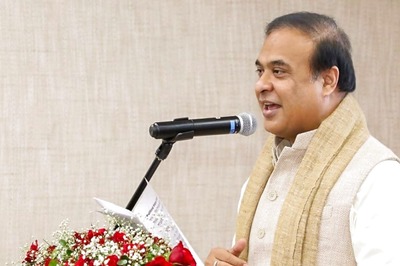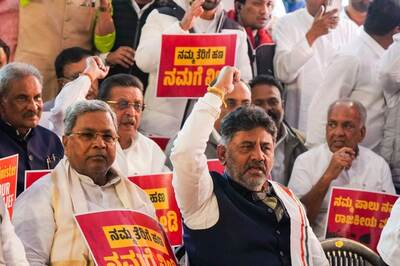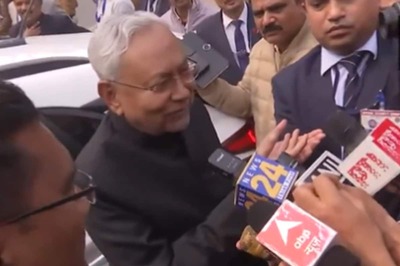
views
What is happening within the Mulayam Singh Yadav family may have a simple explanation.
It is not about a breakthrough in Indian socialist politics, nor is it a family unable to hide its internal strife from the public.
It is about a generation gap in understanding the changed social fabric of Uttar Pradesh, and especially of the basic cadre of the Samajwadi Party.
Go back a quarter of a century, when Mulayam led one of the factions to emerge out of the failed Janata Dal (People's Party) of VP Singh fame. That was 1992. Since then and till now, without even the simplest of socialist pretences, Mulayam has managed to chug his party along in Uttar Pradesh.
He did this with the help of his brother Shivpal, no doubt. Son Akhilesh was a kid those days.
It is an open secret how the brothers corralled support for the party in the state. Brawn was the primary factor which settled scores and differences. There were no pretences.
Good old rustic knowledge was at work. Rustic logic that believed in harsh and instant justice was a premium value. Those were the days when a well-oiled lathi spoke better than even a loud mouth. Slowly, but surely, the cadre was built with caste loyalty as the primary consideration.
The Muslims were roped in to complete the secular façade of the party – a successful manoeuvre previously perfected by Mulayam's "relation" Laloo Yadav in Bihar.
In district headquarters, zilla and panchayats and villages all over Uttar Pradesh, trusted lieutenants of the Yadav brothers set up their administrative machinery. It had two objectives: Draw and consolidate support at any cost, and keep the revenue flowing.
That the party was also in power, whether in the state or at the Centre in the form of Mulayam's Cabinet berth, that there were repeated allegations of financial misdemeanors, that extortion and crime had touched a new high in many districts of UP – all these contributed to the strengthening of the mass base of the party.
In 2012, there was a major change. Young Akhilesh, who had come of age, was married, with a degree from an Australian university, made his entry into the state politics. There was a striking resemblance with Mulayam in the way their noses resembled. He later became chief minister.
Initially, the older gang did not take him seriously. He was after all, the "chhotu" of the family. That was a mistake which perhaps sowed the seeds of the family strife.
Akhilesh was young, but he had his own thinking. He liked his father. Whether he also respected his father? Yes, because he owns the party, the son always said. There were several uncles, Shivpal being the over-bearing of them all. There were others like Azam Khan, Naresh Chandra Uttam, Dharampal Yadav and, of course, Ramgopal Yadav, Mulayam's cousin and Akhilesh's favourite uncle.
The young chief minister tolerated the older generation for more than two years. Then he decided enough is enough. He began to talk back to them, challenge them and their actions, began to assert his authority. After all, it was his chance to consolidate his position not only as the political heir of Mulayam but also develop a political base of his own and of his own custom.
That explains largely the old versus new friction.
The older generation failed to grasp that the changes taking place within the Mulayam family were also taking place among all Yadav households in the state. Over two decades of economic and political dominance – Mulayam's favourite mantra to keep his flock together being the posting of Yadavs at all levels of the government – had made the community powerful.
It began to appreciate the benefits of education, social decorum, craved for social and societal acceptance and, among the OBCs of UP, became the only community to aspire for modern living.
This change in the mental and social set-up brought about attitudinal changes. The Yadavs today have the strongest middle class section among all other communities in UP, save perhaps two upper caste communities.
And the Yadav middle class, once it arrived, began keeping a distance from the past image of a section of the community. It did not like crime and criminals. It would not associate its youth with history sheeters. Criminal activities like kidnapping, hoarding, roughing people up, and the like, were looked down upon. The Yadav youth learnt English, would communicate in that language, and started going out of UP for higher studies. Akhilesh and his step-brother Prateek – who has a management degree from Leeds, UK – were the new models.
The older generation remained immune to these key changes. If it was made aware of them, it thought nothing of the changes. The senior leaders still stick to old, now ancient, values, and expect the youngsters to continue to follow them.
The schism which began to grow between the young and the old in the Mulayam household is at the root of all strife. Amar Singh, Sadhana Singh, this and that, etc, are factors which only exploited this. Mulayam is a Yadav by birth. Akhilesh is a Yadav by co-incidence.




















Comments
0 comment